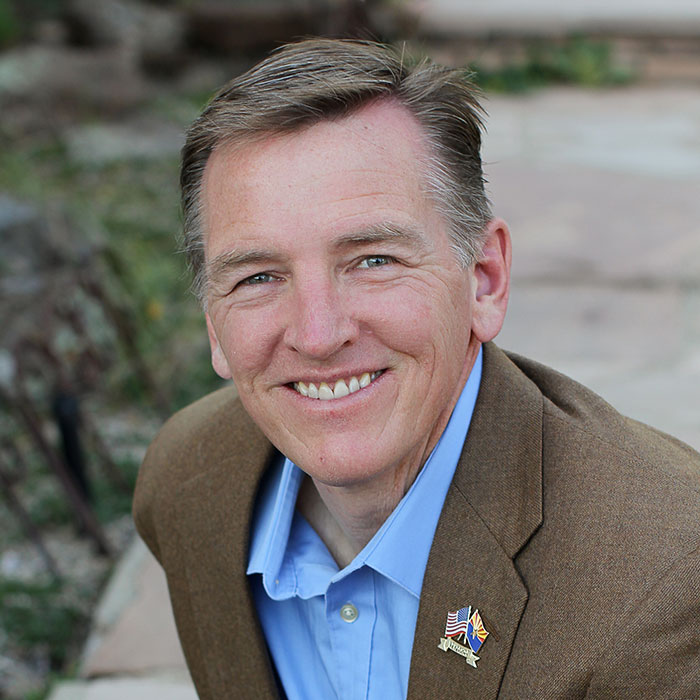Weekly Columns and Op-Eds
Common Sense Forest Bill Passes House Of Representatives
Washington, DC,
September 26, 2013
After the tragic deaths of the fallen heroes in Yarnell, I joined Vice-President Biden and thousands in Prescott, Arizona at a memorial service for the 19 elite firefighters, known as the Granite Mountain Hotshots. The outpouring of support at the memorial service, and the prior memorials attended by thousands, made one thing certain: the entire nation shares in this loss.
Common Sense Forest Bill Passes House Of Representatives After the tragic deaths of the fallen heroes in Yarnell, I joined Vice-President Biden and thousands in Prescott, Arizona at a memorial service for the 19 elite firefighters, known as the Granite Mountain Hotshots. The outpouring of support at the memorial service, and the prior memorials attended by thousands, made one thing certain: the entire nation shares in this loss. The Yarnell tragedy hit home not only because I represent the communities affected, but because since being elected to Congress I have worked on forest management issues for several years. As a representative of a rural area blessed with abundant forests, and as a member of the House Natural Resources Committee, I have led the charge to establish policies that would improve public safety, protect our environment and put people back to work in our forests. This includes legislation I introduced in Congress earlier this year and which recently passed the House of Representatives, the Catastrophic Wildfire Prevention Act, H.R. 1345. My legislation will allow wildfire prevention projects to move forward quickly when the public is at risk. It also empowers the private sector to create much-needed rural jobs, resurrecting the timber industry as workers thin millions of acres of ever-thickening forests. In recent years, Arizona has suffered some of the largest wildfires in its recorded history, including the Wallow Fire that impacted over 504,500 acres of Apache-Sitgreaves National Forest land and resources. Due to dense fuel accumulation from years of bad forest management, approximately 290,430 acres (58 percent) burned at moderate-high and high severity which resulted in considerable loss of forest vegetation. The Forest Service notes that additional tree mortality can be expected in the next four years as remaining trees die of cambium/root damage from heat, insects and disease infestations and other post-fire conditions. Currently, 425 million board-feet of timber may be available for salvage from the burn area, but time is running out and red tape is preventing companies from appropriately salvaging the timber. After just a few years, most burned timber is not salvageable due to rot. Thousands of animals perished, including a substantial portion of the Mexican Spotted Owl population. Ecologists estimate that in 2011 between 60 and 80 Mexican Spotted Owl PACs (Protected Activity Centers) were degraded or destroyed by the three major fires in Arizona. Further, the fire cost tens of millions to fight and millions of dollars of lumber burned. The full-cost accounting for the Wallow Fire will exceed $1 billion dollars according to some estimates. Prior to that, the Schultz Fire blazed and denuded all growth thus causing flooding that year, including the death of a child. We have to acknowledge a truth: forests have to be thinned to remain healthy. If we do not thin forests through thinning and brush clearing, Mother Nature will do it for us by catastrophic wildfire. Indeed, prior to modern fire suppression, Mother Nature renewed forests through fire. One way or another the forest will be cleared and new growth will emerge. Leaving it up to nature, however, results in human and animal deaths, flooding, loss of habitat and loss of timber resources. It is no coincidence that the largest fires in Arizona have taken place after the timber industry was all but shut down in the 1990s after costly environmental lawsuits. Environmentalists motivated to save species and forest, instead inadvertently set the stage for the massive destruction of both. The tragic consequences of forest mismanagement cost Arizonans property, natural resources, wildlife, and the economic growth that would have come from putting people back to work thinning our forests. The time is long overdue for a change to our forest management policy. Yet, rather than work to address this increasingly dangerous problem and prevent fires, the current federal system is reactionary and continues to prioritize fighting fires instead of preventing them. Overgrowth of our forests becomes inevitable and turn once healthy forests into tinder boxes waiting for a spark. The consequence: more than 9 million acres across the West burned in 2012. That is nearly twice what we saw two decades prior when forest thinning was permitted. I have worked tirelessly to convince my fellow House members to consider my legislation and to act swiftly to reduce the chances of future catastrophic fires. Passage of this wildfire bill in the House puts us one-step closer to implementing a common-sense approach to forest management that we know works. U.S. Congressman Gosar is a Republican from Arizona’s Fourth Congressional District, representing Yarnell, and a member of the House Natural Resources Committee. This op-ed appeared in the Tuesday, September 24, 2013 print edition of the Payson Roundup. Read the article online HERE. |
